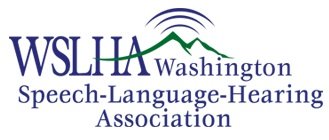Washington Speech-Language-Hearing Association
Washington Speech-Language-Hearing Association (WSLHA) is an organization that promotes professional excellence in speech-language pathology and audiology.
Mission: Empowering and connecting current and future professionals through advocacy, education, and leadership development, to foster equitable, inclusive, and culturally respectful collaboration with our communities.
Vision: An engaged and thriving community empowered to enrich communication and quality of life for all.
WSLHA is an American-Speech-Language-Hearing Association (ASHA) recognized state association.
Webinar Recording: Virtual Town Hall for School-based Speech-Language Pathologists
On December 9, 2025, WSLHA held a Town Hall to share results from a survey on caseload/workload issues among SLPs working in public schools. Strategies for advocating for better working conditions for SLPs to ensure effective service delivery to students were shared.
View the recording here. WSLHA members can access the survey data through the member portal.
Research Opportunity - Call for Volunteers
WSLHA members, how do you translate what you glean from CE activities into your practice?
Are you attending the October 11th seminar Building Neurodiversity Awareness and Fostering Thriving Connections? Please consider participating in a discussion board group held as a wrap-around support for learning. Findings will inform ways WSLHA can enhance future CE offerings. This study is being conducted by Teryl Wood, SLPD, CCC, a Board member of WSLHA, as part of her EdD dissertation work with Northeastern University.
What do SLPs do with their CE Learning? DO YOU WANT TO HELP? PLEASE CONTACT ME!
Volunteer Opportunities Available – Are You?
Are you looking for a way to grow and take advantage of an opportunity to help yourself, your colleagues and your patients, clients, or students. WSLHA, as a volunteer-based organization, has many such opportunities.
Several of our committees need your ideas, your creativity and some of your time. Consider joining one of them. Contact the WSLHA website and complete a volunteer application or email the office to express your interest. WSLHA’s Volunteer Coordinator, Judith Bernier, will contact you to explore the possibilities. Briefly most committees meet once a month for an hour with some work on projects between meetings as needed. Time involvement is estimated at 1-3 hours a month.
The following committees are looking for your assistance – Communications, Membership, School Affairs, and Continuing Education. It’s a great way to meet new colleagues, to strengthen your skill set, to develop your leadership and to grow as a professional. Come join our community of Washington SLPs/Audiologists and Assistants.
To C or Not to C: Making Decisions about Your SLP Licensure and Accreditations in Washington State
Disclosure: WSLHA receives grants and advocacy support from ASHA
Recently, WSLHA has received questions from our SLP community about maintaining ASHA CCCs. As the cost of living is on the rise, many SLPs are looking for ways to cut expenses. ASHA membership or certification is not required to be a member of WSLHA, and we neither endorse nor oppose ASHA membership or certification. While the decision about maintaining your ASHA Cs is yours and yours alone, there are several things to consider:
Clinical and ESIT settings. Most clinical settings and ESIT agencies in Washington require SLPs to hold state licensure from the Department of Health. ASHA Cs are not required for state licensure, but licensure requirements mirror the requirements for Cs. Some insurance companies and healthcare organizations still require ASHA Cs in addition to proof of license. If you are considering dropping your ASHA Cs, talk with your employer or insurers first.
School settings. While ESA certification is required by OSPI for SLPs working in Washington State public schools, ASHA certification is not. However, some school districts prefer or require their SLPs to hold licensure and/or ASHA Cs. If you already have your ASHA Cs, ESA renewal is easy. Just upload a copy of your ASHA certificate when you log into the e-certification system. If you do not have ASHA Cs, you will need to provide proof of 100 clock hours earned over a 5-year period.
Supervision: If you enjoy supervising and mentoring students and clinical fellows, take note. For students enrolled in ASHA accredited Master’s degree programs, ASHA requires that supervising clinicians hold and maintain their Cs.
Working abroad: Considering working outside of the US? A number of countries have mutual recognition of professional association credentials. For example, ASHA certification is recognized by the national associations of Canada, Ireland, UK, Australia, Hong Kong and Singapore, but those countries may not recognize your state licensure. If you plan to work abroad, check your destination country’s requirements first.
Changing professional settings. Many clinicians start their career in one setting and explore others along the way. One of the advantages to being an SLP is the option to work across different settings. While ASHA Cs might not be required in your current setting, they could be required in a future setting.
ASHA Membership vs Certification. Did you know that you don’t have to be an ASHA member to retain your Cs? You can also be an ASHA member without certification. Contact the ASHA Center for more information about these options and the associated costs.
Final thoughts. WSLHA encourages you to carefully consider your options for ASHA certification and membership, keeping your present and future needs in mind. Regardless of your ASHA certification or membership, we encourage you to be involved in WSLHA. Many of the decisions that are made at the state level affect your practice. WSLHA is your voice in Washington State.
Deirdre Curle, PhD, CCC-SLP is Past-President of WSLHA. She lives in Seattle and is a speech-language pathologist at the Washington Center for Deaf and Hard of Hearing Youth. She holds ASHA Cs and affiliation with SIG 9, Pediatric Hearing and Hearing Disorders.
Resources
International Association of Communication Sciences and Disorders
Revised Code of Washington: RCW 18.35
Washington Administrative Code: WAC 246-828






